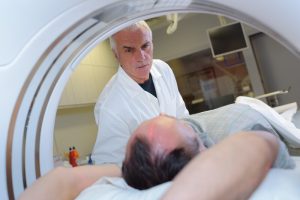 In February 2015, Mr A attended an out of hours GP when he was in severe abdominal pain. He was told to seek further medical assistance and recommended an over the counter medicine.
In February 2015, Mr A attended an out of hours GP when he was in severe abdominal pain. He was told to seek further medical assistance and recommended an over the counter medicine.
Gall stones diagnosed at hospital
When Mr A attended his GP the following day, he was referred to Derby Hospital. He attended the hospital, where he remained for four nights. During his time there, an ultrasound and CT scan were performed, and Mr A was told he had gall stones. The consultant recommended that he return for an MRCP (magnetic resonance cholangiopancreatography – a special type of MRI scan) as an outpatient.
Failure to organise MRI scan
Unfortunately, no outpatient appointment was made but Mr A received a letter asking him to attend hospital for an appointment in May. At this appointment, he was once again told that he needed an MRCP. The scan took place on 11 June, following which Mr A was not advised of the result. In late July, Mr A went to see his GP who referred him to another consultant at Derby Hospital.
Gall stones result in pancreatitis
Before Mr A was able to see the consultant he had been referred to, he was rushed into hospital when paramedics were called to his work by a work colleague. Initially, Mr A was admitted to the surgical assessment unit at Derby Hospital but was quickly moved to the high dependency unit. He was told that he had gallstones and that his stomach had swelled so much that it was pressing on his lungs and he wasn’t getting enough air. Mr A condition worsened substantially over the next couple of days and Mrs A was told that he could die. He was put into an induced coma and given a tracheostomy. Mrs A was told that the gallstones had blocked the pancreas and had caused pancreatitis. Mr A was kept in intensive care for some time but did then start to recover somewhat. He already suffered from non-insulin dependent diabetes, but pancreatitis meant that he had now become dependent on insulin. He also suffered an infection whilst in hospital. He was told that he would need an operation to remove the gallstones at some point.
Consultant admits trauma could have been avoided with earlier intervention
Eventually, Mr A was sent home, but he was weak and needed a lot of help from his wife. Whilst at home, he had to return to hospital by ambulance several times due to illness. In October 2015, Mr A eventually saw the second consultant to whom his GP had referred him. He was told that he was very unlikely to be able to return to his job as a lorry driver, which upset him a great deal. It was also alleged that he was also told by the consultant that, had he been Mr A’s consultant in February 2015, he would have operated immediately, and Mr A would not have had to go through any of the trauma he had experienced.
Mr A’s gallstones were removed in November 2015 and he stayed in hospital for about three weeks. Whilst he is now much better, he has still not fully recovered, and his life has changed. He has eventually returned to work, as a lorry driver, but as a consequence, he has suffered psychologically.
Negligent treatment and breach of duty of care
Cleary, Mr A’s medical treatment had been negligent, and he contacted Graysons to see if he was able to obtain any redress. Mr A’s medical records were requested and various experts instructed. The experts were supportive, in that the hospital had breached its duty of care to Mr A. Its staff had been responsible for Mr A’s care and treatment and they were negligent in that, amongst other issues, they had failed to arrange an MRCP until four months after Mr A was initially seen at the hospital. The hospital admitted liability in part and offered a small settlement of £15,000. Due to much persistence, the trust eventually admitted the remainder of the allegations, by which time the claim was issued in the courts.
Carol negotiated further with the trust’s solicitors and they made an increased offer of £150,000, which her client accepted.
Mr A was pleased with the outcome saying that it had been a long journey, but it was worth it in the end …….. both he and his wife were treated with respect and guided throughout the process.
If you, or a member of your family, believe that you have received substandard treatment for a medical professional, contact our experts now. We will assess your case and advise on its merits and your funding options. If we take on your case, we can offer you a no win, no fee arrangement. Please contact our dedicated enquiry team to obtain legal advice using the contact details below.
Author: Carol Simpson, partner and head of medical negligence.

